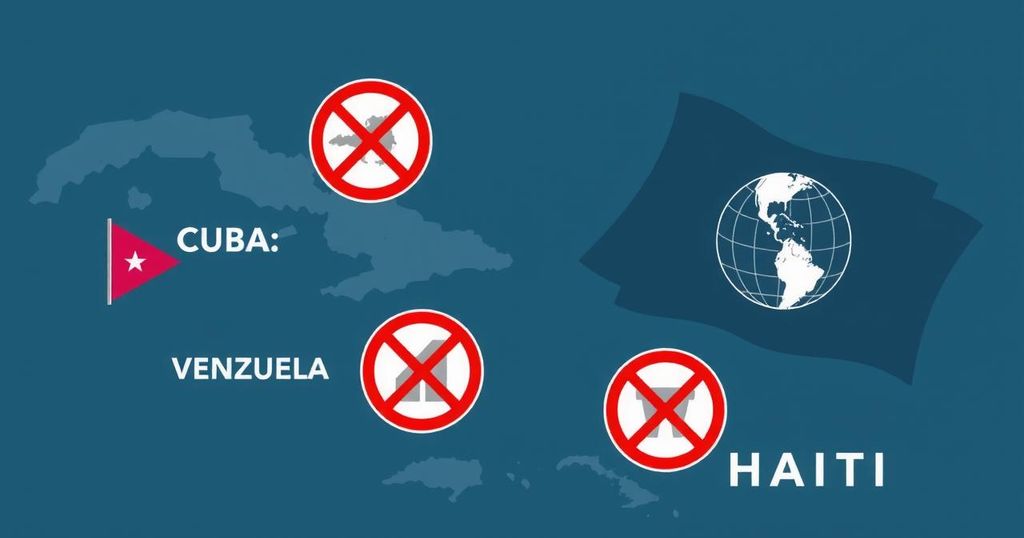Trump Imposes Travel Bans on Haiti, Cuba, and Venezuela Amid Immigration Crackdown

President Donald Trump recently imposed a travel ban on Haitian nationals and partial restrictions on Cubans and Venezuelans, set to take effect on June 9. This decision is part of a broader strategy to tighten immigration controls due to security concerns. Critics voice dismay, labeling the ban as racist and harmful to families and communities in need.
In a significant move, President Donald Trump announced a comprehensive travel ban on Haitian nationals entering the United States while imposing partial limits on Cubans and Venezuelans. This new directive, which will take effect on June 9, is part of the broader effort by the administration to tighten immigration controls, particularly from these nations. The White House stated that the ban “fully restricts and limits” Haitian nationals and “partially restricts” those from Cuba and Venezuela, amid concerns over security and terrorism.
According to the proclamation, most immigrant and non-immigrant visa applications for Cubans and Venezuelans will no longer be processed after June 9. Specifically, those seeking tourist, business, student, or academic visas will find the pathways to entry closed. Haitian nationals face a complete ban, although present valid visa holders are exempt from these regulations. Other affected countries include Afghanistan, Iran, Libya, and Sudan, reflecting a broad, strategic clampdown on immigration from certain nations deemed at risk.
The restrictions arise from Trump’s campaign promise to reform immigration and enhance national security by evaluating the vetting processes of several countries. The proclamation underscores that whether suspensions should continue or lift will be reassessed every six months, ensuring adaptability in approaching immigration policy. Reflecting the gravity of the announcement, several attendees at the annual Haiti Funders Conference expressed shock and condemned the measure as discriminatory. Brian Concannon of the Institute for Justice and Democracy referred to it as “another in a long line of transparently racist attacks against Haitians.”
Furthermore, the proclamation highlighted Cuba’s status as a state sponsor of terrorism, citing its failure to cooperate on repatriation protocols. Venezuela, on the other hand, was accused of lacking the infrastructure necessary for the issuance of civil documents. Meanwhile, reports indicate that over 4,600 Venezuelan nationals were deported back to their country in just four months, despite ongoing tensions between Caracas and Washington.
Justin Imbert, a community leader in Miami, pointed out how critical visa access is for families split between Haiti and the U.S. “Banning them from accessing the country is yet another chapter in the tragedy of Haiti,” he stated. The travel restrictions coincide with uncertainty over the continuation of Temporary Protected Status for over 500,000 Haitians who currently reside in the U.S., adding further anxiety to families uprooted by political and social turmoil.
Critics of the trumpet bans have raised concerns about the ramifications of such policies. Adelys Ferro from the Venezuelan American Caucus expressed outrage, labeling the proclamation as overtly racist. Similarly, Human Rights First denounced the move as a xenophobic policy shift, arguing that it jeopardizes not only individual lives but also compromises national security by alienating vulnerable groups.
This latest proclamation is not an isolated case; rather, it builds on Trump’s previous travel restrictions initiated in January 2017, reflecting a continued pattern of immigration limitation based on nationality. As challenges in the courts regarding these bans await resolution, the implications for affected communities remain increasingly dire. The reality is that these travel bans sever crucial connections between families and disrupt the rights of asylum seekers desperately seeking refuge amidst ongoing crises.
As the situation unfolds, advocates promise to contest these measures while being ever vigilant about the administration’s stance on immigration. What is clear, though, is that a significant portion of the Haitian and Venezuelan nationals now face uncertain futures as they navigate these latest restrictions. Documented or not, the lives of many will undoubtedly be impacted by this broad crackdown on immigration.
President Trump’s announcement of a travel ban targeting Haitian nationals and imposing partial restrictions on Cubans and Venezuelans marks a significant shift in U.S. immigration policy. This order, set to take effect on June 9, aims to enhance national security measures while raising serious concerns among human rights advocates and community leaders. Multiple critics argue that such measures not only fail to address security threats but also perpetuate discriminatory practices against vulnerable populations.
Original Source: www.yahoo.com







